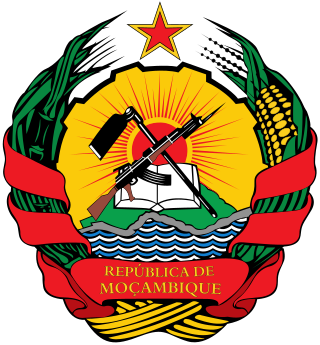
Politics in Mozambique takes place in a framework of a semi-presidential representative democratic republic, whereby the President of Mozambique is head of state and head of government in a multi-party system. Executive power is exercised by the government. Legislative power is vested in both the government and the Assembly of the Republic.

The islands of São Tomé and Príncipe were uninhabited at the time of the arrival of the Portuguese sometime between 1469 and 1471. After the islands were discovered by the explorers João de Santarém and Pêro Escobar, Portuguese navigators explored the islands and decided they would be a good location for bases to trade with the mainland.
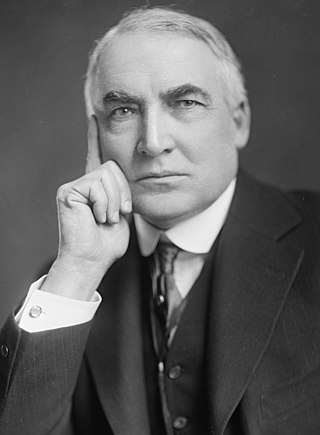
Presidential elections were held in the United States on November 2, 1920. Republican senator Warren G. Harding of Ohio defeated Democratic governor James M. Cox of Ohio. It was the first election held after the end of the First World War, and the first election after the ratification of the Nineteenth Amendment which gave equal votes to men and women. It was the third presidential election in which both major party candidates were registered in the same home state, and the last time that the state was not New York. It was the first presidential election to have its results broadcast by radio. Coincidentally, the election was held on Harding's 55th birthday.

The president of the Republic of Finland is the head of state of Finland. The incumbent president is Alexander Stubb, since 1 March 2024. He was elected president for the first time in 2024.

A semi-presidential republic, or dual executive republic, is a republic in which a president exists alongside a prime minister and a cabinet, with the latter two being responsible to the legislature of the state. It differs from a parliamentary republic in that it has an executive president independent of the legislature; and from the presidential system in that the cabinet, although named by the president, is responsible to the legislature, which may force the cabinet to resign through a motion of no confidence.

The president of Germany was the head of state under the Weimar Constitution, which was officially in force from 1919 to 1945, encompassing the periods of the Weimar Republic and Nazi Germany.
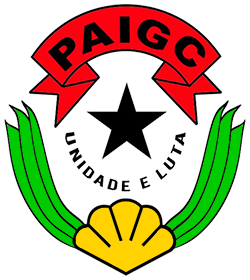
The African Party for the Independence of Guinea and Cape Verde is a political party in Guinea-Bissau. Originally formed to peacefully campaign for independence from Portugal, the party turned to armed conflict in the 1960s and was one of the belligerents in the Guinea-Bissau War of Independence. Towards the end of the war, the party established a socialist one-party state, which remained intact until multi-party democracy was introduced in the early 1990s. Although the party won the first multi-party elections in 1994, it was removed from power in the 1999–2000 elections. However, it returned to office after winning parliamentary elections in 2004 and presidential elections in 2005, since which it has remained the largest party in the National People's Assembly.

Elections in Portugal are free, fair, and regularly held, in accordance with election law.

Elections in Guinea-Bissau take place within the framework of a multi-party democracy and a semi-presidential system. Both the President and the National People's Assembly are directly elected by voters.
Poland has a multi-party political system. On the national level, Poland elects the head of state – the president – and a legislature. There are also various local elections, referendums and elections to the European Parliament.

Geraldo José Rodrigues Alckmin Filho is a Brazilian physician and politician currently serving as 26th vice president of Brazil. He previously was the Governor of São Paulo for two nonconsecutive terms, the longest serving since democratization, 2001 to 2006 and 2011 to 2018.
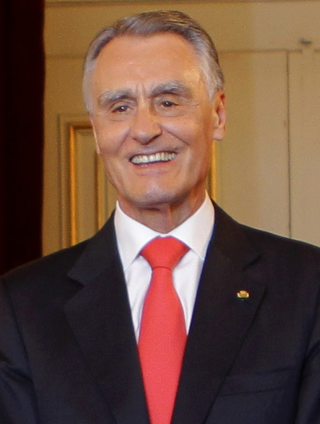
Presidential elections were held in Portugal on 22 January 2006 to elect a successor to the incumbent President Jorge Sampaio, who was term-limited from running for a third consecutive term by the Constitution of Portugal. The result was a victory in the first round for Aníbal Cavaco Silva of the Social Democratic Party candidate, the former Prime Minister, won 50.54 percent of the vote in the first round, just over the majority required to avoid a runoff election. It was the first time in which a right-wing candidate was elected President of the Republic since the 1974 Carnation Revolution.

The vice president of Brazil, officially the vice president of the Federative Republic of Brazil, or simply the vice president of the republic is the second-highest ranking government official in the executive branch of the Government of Brazil, preceded only by the president. The vice president's primary role is to replace the president in the event of their death, resignation, or impeachment, and to temporarily take over the presidential powers and duties while the president is abroad, or otherwise temporarily unable to carry out their duties. The vice president is elected jointly with the president as their running mate.

The presidential line of succession defines who may become or act as President of the Federative Republic of Brazil upon the death, resignation, incapacity or removal from office of the elected president, and also when the president is out of the country or is suspended due to impeachment proceedings.
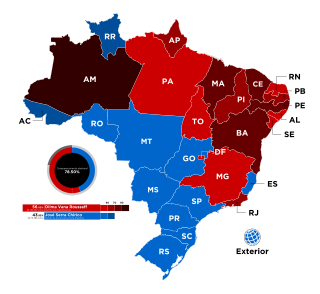
General elections were held in Brazil on 3 October 2010 to elect the president, National Congress and state governors. As no presidential candidate received more than 50% in the first round of voting, a second round was held on 31 October to choose a successor to Luiz Inácio Lula da Silva of the Workers' Party (PT), who was constitutionally ineligible to run for a third term as he has already served two terms after winning the elections in 2002 and being re-elected in 2006.
A presidential election was held in El Salvador between 13 and 15 January 1919 when Salvadorans elected their next president to serve a four-year term from 1919 to 1923. In the election, Jorge Meléndez defeated opponents Pío Romero Bosque and Arturo Araujo and was elected as the country's president; Alfonso Quiñónez Molina, the then-provisional president, was elected as Jorge Meléndez's vice president.

Presidential elections were held in Portugal on 6 August 1923. The Congress of the Republic elected the president in Lisbon instead of the Portuguese people. However the new president Manuel Teixeira Gomes was elected In absentia, meaning that he wasn't present during the election.

General elections were held in Brazil on 7 October 2018 to elect the president, National Congress and state governors. As no candidate in the presidential election received more than 50% of the vote in the first round, a runoff round was held on 28 October.

Presidential elections were held in Portugal on 24 January. The incumbent President, Marcelo Rebelo de Sousa, was reelected for a second term.

General elections were held in Brazil on 2 October 2022 to elect the president, vice president, the National Congress, the governors, vice governors, and legislative assemblies of all federative units, and the district council of Fernando de Noronha. As no candidate for president—or for governor in some states—received more than half of the valid votes in the first round, a runoff election for these offices was held on 30 October. Luiz Inácio Lula da Silva received the majority of the votes in the second round and became president-elect of Brazil.



















